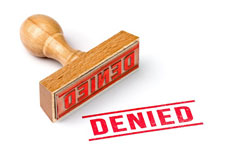 When there is a potential for litigation regarding property damage, your association’s legal counsel will sit down with the Board of Directors to analyze whether the alleged property damage resulted from the association’s negligence in any form. If the association is put on notice of a potential negligence claim, it is advisable to immediately report the matter to your Commercial General Liability (“CGL”) insurance carrier.
When there is a potential for litigation regarding property damage, your association’s legal counsel will sit down with the Board of Directors to analyze whether the alleged property damage resulted from the association’s negligence in any form. If the association is put on notice of a potential negligence claim, it is advisable to immediately report the matter to your Commercial General Liability (“CGL”) insurance carrier.
For example, a popular homeowner concern is a common area roof leak. Upon notice of the alleged leak, it is the association’s duty to follow-up with the homeowner and initiate an investigation within a reasonable timeframe. (Corp. Code §7231(a)). The association has a duty under its governing documents to determine if the homeowner’s allegation of a common area leak is true or not (i.e., hire a leak detection specialist). Upon analyzing the specialist’s report, if it is determined there is a leak within the common area, the association is bound by its governing documents to fix it. (Civil Code §4775.) Note that in the common area roof leak scenario, the association would repair the common area roof, but not any interior or content damage. Therefore, the homeowner may sue under the CGL policy for any interior repairs and content damage on the basis the association failed to maintain the common area roof. The association looks to the CGL policy for the insurance company’s duty to defend and coverage of the loss.
Of course, investigations are time consuming and costly as they often require the contracting of knowledgeable experts. The CGL policy may kick in if there is a clear allegation that the association was negligent in failing to repair and maintain the association’s common areas as required under the governing documents.
However, what if the insurance adjuster denies the claim because it is not covered under the CGL policy or falls under one of the policy’s exclusions? This is where your legal counsel will dispute the adjuster’s argument and advocate why the CGL policy should cover the claim.
There are key provisions within the CGL policy that your attorney will analyze. “Property damage” and “occurrence” are two of the main terms insurance adjusters will often use to either provide or deny coverage under the Commercial General Liability policy.
“Property damage” usually means:
- Physical injury to tangible property, including all resulting loss of use of that property. All such loss of use will be deemed to occur at the time of the physical injury that caused it; or
- Loss of use of tangible property that is not physically injured. All loss of use will be deemed to occur at the time of the “occurrence” that caused it.
“Occurrence” usually means, “An accident, including continuous or repeated exposure to substantially the same general harmful conditions.”
Most CGL policies will cover a potential property damage claim if: (1) the property damage is caused by an occurrence within the covered area; (2) the property damage occurs during the policy period; (3) the association did not have notice of the property damage occurring, in whole or in part; and (4) the claim was reported as soon as possible to the insurance company. Usually, property damage will be deemed to have been known to have occurred at the earliest time when the association received notice of an occurrence or a claim. Therefore, it is extremely important to notify the association’s insurance agent, property manager and your legal counsel as soon as possible if there is a potential for a claim.
| The above is but a snippet of a potential issue an HOA might face. For more on arguing bad faith claims, please see our blog post on Insurance Coverage Denied & Bad Faith Claims. |
-Blog post authored by TLG Attorney, Vivian X. Tran, Esq.
 HOA Lawyer Blog
HOA Lawyer Blog

